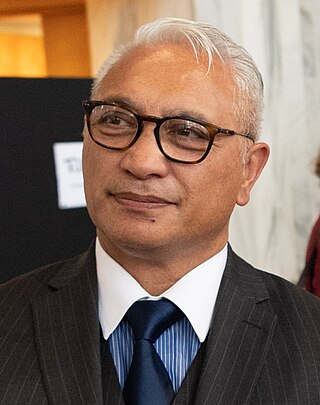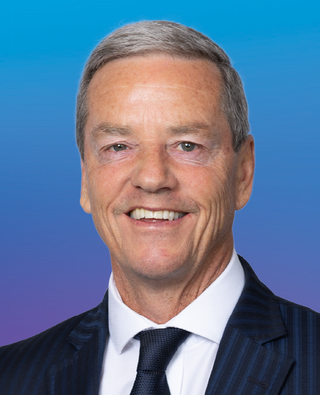Related Research Articles
Barbara Joy Stewart is a former New Zealand politician. She was a Member of Parliament for the New Zealand First party from 2002 to 2008 and again from 2011 to 2017.

Aupito Tofae Su'a William Sio is a politician who became a member of the New Zealand House of Representatives on 1 April 2008 for the Labour Party as a list MP. From the November 2008 election to 2023, he represented the Māngere electorate.

The 48th New Zealand Parliament was a term of the Parliament of New Zealand. Its composition was determined at a general election held on 17 September 2005. The new parliament met for the first time on 7 November 2005. It was dissolved on 3 October 2008.

David Allister Bennett is a New Zealand former National Party politician. He was the Member of Parliament for Hamilton East from 2005 to 2020 and a list MP from 2020 to 2023. He was Minister for Food Safety and Minister of Veterans' Affairs in the final year of the Fifth National Government.

Women's suffrage was an important political issue in the late-nineteenth-century New Zealand. In early colonial New Zealand, as in European societies, women were excluded from any involvement in politics. Public opinion began to change in the latter half of the nineteenth century and after years of effort by women's suffrage campaigners, led by Kate Sheppard, New Zealand became the first nation in the world in which all women had the right to vote in parliamentary elections.

Hamilton West is a New Zealand parliamentary electorate. It has been held by Tama Potaka MP of the National Party since the 2022 by-election.

Louisa Hareruia Wall is a New Zealand former double international sportswoman, former politician, and human rights advocate. She represented New Zealand in both netball as a Silver Fern from 1989 to 1992 and in rugby union as a member of the Black Ferns from 1995 to 2001, including as a member of the 1991 World Netball Championships runner-up team and 1998 Women's Rugby World Cup winning team.

Timothy Harley Macindoe is a New Zealand politician who has served as a member of the Hamilton City Council for the East Ward since 2024. Macindoe was previously a Member of Parliament for the Hamilton West electorate from 2008 to 2020. He served as the Minister of Customs for the final six months of the Fifth National Government.

Melissa Ji-Yun Lee is a New Zealand politician. She was elected to the House of Representatives as a list MP for the National Party in the 2008 election. She currently serves as the 11th Minister for Economic Development, 28th Minister for Media and Communications and 2nd Minister for Ethnic Communities.

Louise Claire Upston is a New Zealand politician. She was elected as a Member of the New Zealand House of Representatives for Taupō, representing the National Party, in the 2008 general election.

Amy Juliet Adams is a former New Zealand politician of the New Zealand National Party and the current chancellor of the University of Canterbury, Christchurch, New Zealand. She was the Member of Parliament for Selwyn from 2008 to 2020, when she retired.

Alfred Ngaro is a New Zealand politician, serving as leader of New Zeal since 2023. He was a list member of the New Zealand House of Representatives from 2011 to 2020, representing the National Party.

Scott Anthony Simpson is a New Zealand politician and a member of the New Zealand House of Representatives. He is a member of the National Party.

Andrew Henry Bayly is a New Zealand businessman, adventurer, and politician. He was elected to the New Zealand Parliament at the 2014 general election as the MP for Hunua, representing the New Zealand National Party. He is currently the MP for Port Waikato.

Timothy John van de Molen is a New Zealand politician. He is a Member of the House of Representatives for the Waikato electorate and a representative of the National Party.

Simeon Peter Brown is a New Zealand politician and Member of Parliament in the House of Representatives for the National Party.

Jamie Ross Strange is a New Zealand politician. He is a Member of Parliament in the House of Representatives for the Labour Party.

Anahila Lose Kanongata'a is a New Zealand social worker and politician. She served as a Member of Parliament for the Labour Party from 2017 to 2023.
James Samuel McDowall is a former New Zealand politician. He was a Member of Parliament for ACT New Zealand from 2020 until 2023.

The 2022 Hamilton West by-election was a by-election in New Zealand's Hamilton West electorate. The seat became vacant due to the resignation of former Labour Party MP Gaurav Sharma on 18 October 2022 after expulsion from the party caucus.
References
- 1 2 O'Rourke, Simon (17 August 2005). "Old pro and novice get ready to rumble". Waikato Times . p. 7.
- ↑ Heffield, James (4 May 2005). "Platinum pair going strong". Waikato Times . p. 13.
- ↑ Tiffany, Martin (13 September 2008). "Refocused Yates remains busy". Waikato Times . p. A14.
- ↑ Rasmussen, Warwick (8 August 2007). "City MP quits for shot at council". Waikato Times . p. 1.
- ↑ O'Rourke, Simon (23 August 2006). "MPs get their final reports". Waikato Times . p. 7.
- ↑ "Election candidates speak out on issues". Waikato Times . 1 August 1996. p. 2.
- 1 2 "Yates, Dianne – New Zealand Parliament". www.parliament.nz. Retrieved 8 April 2024.
- ↑ Part 1: Votes recorded at each polling place (Technical report). New Zealand Chief Electoral Office. 1993. p. 32.
- ↑ "Elections New Zealand – results for Hamilton East electorate 2002". Archived from the original on 14 June 2007. Retrieved 1 June 2007.
- 1 2 Yates, Dianne (15 March 1994). "Address in Reply". Parliamentary Debates (Hansard) . Vol. 539. Parliament of New Zealand: House of Representatives. p. 412–418.
- ↑ "Yates, Dianne: Human Assisted Reproductive Technology Bill". New Zealand Parliament. 10 November 2004. Retrieved 8 April 2024.
- ↑ Legge, Michael; Fitzgerald, Ruth (February 2021). "Does the Human Assisted Reproductive Technology Act 2004 need a review?". Policy Quarterly. 17 (1): 79–83 – via Proquest.
- ↑ Collins, Simon (13 August 2001). "drawing the line". NZ Herald. Retrieved 10 April 2024.
- ↑ "Human Assisted Reproductive Technology Bill". Parliamentary Debates (Hansard) . Vol. 559. New Zealand House of Representatives. 23 April 1997. p. 554.
{{cite book}}: CS1 maint: location missing publisher (link) - ↑ "MP urges new register to identify all parents". NZ Herald. 30 June 2000. Retrieved 9 April 2024.
- ↑ "Bill aims for six weeks paid parental leave". The Evening Post . 18 February 1997. p. 3.
- ↑ Bell, Cathie (10 September 1997). "Govt forced to allow two bills through". The Press . p. 8.
- ↑ Alcohol Healthwatch (2003). Alcohol Health and Safety Advisory Statements (Warning Labels) in New Zealand (PDF) (Report). Retrieved 9 April 2024.
- ↑ Wilson, Margaret (2000). Report of the Attorney-General under the New Zealand Bill of Rights Act 1990 on the Sale of Liquor (Health Warnings) Amendment Bill (PDF) (Report). Retrieved 9 April 2024.
- ↑ "Sale of Liquor (Health Warnings) Amendment Bill". Parliamentary Debates (Hansard) . Vol. 588. New Zealand Parliament: House of Representatives. 11 October 1990. p. 152.
- ↑ Roper, Juliet; Leitch, Shirley (1995). "The electoral reform campaigns in New Zealand: a political communication case study". Australian Journal of Communication. 22 (1): 123–135 – via University of Wollongong.
- ↑ "Consideration of Report of Electoral Law Committee". Parliamentary Debates (Hansard) . Vol. 570. Parliament of New Zealand: House of Representatives. 5 August 1998. p. 664–665.
- ↑ "Employment or exploitation?". NZ Herald. 26 March 2003. Retrieved 10 April 2024.
- ↑ "Prostitution decriminalised, brothels to be licensed". NZ Herald. 25 June 2003. Retrieved 10 April 2024.
- ↑ Young, Audrey (19 February 2003). "MP proposes law to target men who pay for sex". NZ Herald. Retrieved 10 April 2024.
- ↑ "Barnett celebrates 'historic moment' with prostitution bill". NZ Herald. 25 June 2003. Retrieved 10 April 2024.
- ↑ "Hamilton MPs running scared from prostitution bill backlash, says Bos". NZ Herald. 29 April 2004. Retrieved 10 April 2024.
- ↑ "Crimes (Drug Rape) Amendment Bill". New Zealand Parliament. 10 November 2004. Retrieved 10 April 2024.
- ↑ "Crimes (Drug Rape) Amendment Bill". New Zealand Parliament. 9 February 2005. Retrieved 10 April 2024.
- ↑ Ferguson, Rochelle (19 July 2017). "The long dark road to banning tail docking in New Zealand". The Spinoff. Retrieved 10 April 2024.
- ↑ "Hawkins now backs leaky building inquiry". NZ Herald. 19 September 2002. Retrieved 10 April 2024.
- ↑ "Hate speech investigation". NZ Herald. 5 August 2004. Retrieved 10 April 2024.
- ↑ Dye, Stuart (17 March 2005). "Backlash on hate speech proposal". NZ Herald. Retrieved 10 April 2024.
- ↑ "Procedure, Third Reading". New Zealand Parliament. 21 June 2004. Retrieved 10 April 2024.
- ↑ Houlahan, Mike (8 November 2006). "Drinking age stays at 18, review announced [+audio]". NZ Herald. Retrieved 10 April 2024.
- ↑ "Death with Dignity Bill". Parliamentary Debates (Hansard) . Vol. 549. New Zealand Parliament: House of Representatives. 16 August 1995. p. 758.
- ↑ "Death with Dignity Bill". New Zealand Parliament. 30 July 2003. Retrieved 10 April 2024.
- ↑ Pepperell, Susan (8 July 1997). "Super plan's fate hinges on women". Waikato Times . p. 1.
- ↑ "Elections New Zealand – results for Hamilton East electorate 2005". Archived from the original on 20 August 2007. Retrieved 1 June 2007.
- ↑ "Waikato Times – City MP quits for shot at council" . Retrieved 13 August 2007.
- ↑ New Zealand Parliament (19 March 2008). "Valedictory Statement". TheyWorkForYou.co.nz. Archived from the original on 30 June 2008. Retrieved 7 June 2008.
- ↑ New Zealand Parliament (1 April 2008). "Resignations: Dianne Yates, NZ Labour". TheyWorkForYou.co.nz. Archived from the original on 30 June 2008. Retrieved 7 June 2008.
- ↑ New Zealand Parliament (1 April 2008). "List Member Vacancy". TheyWorkForYou.co.nz. Archived from the original on 15 May 2010. Retrieved 7 June 2008.
- ↑ Donoghue, Tim (10 July 2008). "Ex-MP stands to get $80,000 from board appointments". The Dominion Post . p. A2. Retrieved 4 April 2024.